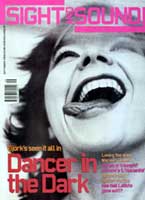Primary navigation

France/Spain/USA 1999
Reviewed by Philip Strick
Our synopses give away the plot in full, including surprise twists.
Dean Corso, a rare books specialist, is hired by demonologist Boris Balkan to authenticate his copy of The Nine Gates of the Kingdom of the Shadows, a book which reputedly reveals a means of entry to the Underworld. Corso intends to compare the two existing copies with Balkan's volume, whose previous owner, Andrew Telfer, committed suicide. Corso discovers that Telfer's widow, Liana, is determined to recover the book. His apartment is ransacked, and a colleague temporarily looking after the book is murdered.
In Spain Corso learns from the antiquarians the Ceniza brothers that some of the book's nine engravings are signed 'LCF', perhaps meaning 'Lucifer'. Comparing the book with the copy owned by Victor Fargas, Corso notes a number of variations in the engravings. Fargas is murdered and the engravings are removed from his copy. Rescued from attack by a mysterious girl, Corso inspects the third surviving edition, held by Baroness Kessler in Paris. He notices discrepancies before the Baroness is killed. Corso realises that the secret of The Nine Gates is to be found in a combination of all three copies.
Liana Telfer obtains Balkan's copy. Corso follows Liana to the mansion where she is to officiate at a Satanist ceremony. Balkan bursts in, strangles Liana, seizes the engravings and the book and prepares to enter Satan's domain. But the invocation is faulty and he dies in a welter of flames. Urged on by the girl, Corso receives the final authentic engraving from the Cenizas and advances through the ninth portal in a blaze of light.
In co-adapting Spanish writer Arturo Pérez-Reverte's novel The Dumas Club into his latest film The Ninth Gate, director Roman Polanski has settled, not unreasonably, for only half the story, an ingenious 'spot-the-difference' murder mystery tricked out with fancy artwork and obscure Latin tags. As its title suggests, the rest of the novel concerns itself with the genesis and popularity of The Three Musketeers. In deleting all mention of Alexandre Dumas while filching bits from his share of the narrative, Polanski has created problems for himself. The serious literary gathering of Dumas admirers, for example, has been translated into a curiously anaemic coven of devil-worshippers, while the urbane Balkan, who employs antiquarian Corso to authenticate a book reputed to reveal an entrance to the Underworld, is an uneasy composite of two characters in the novel.
One of the novel's most teasing ambiguities is the suggestion that the mysterious girl, played by Emmanuelle Seigner, who follows Corso has a supernatural origin. Polanski cheerfully substantiates this with close-ups of her peculiar eyes and startling glimpses of the woman in flight, but then seems at a loss what to make of a demon who bleeds like everybody else and reads How to Make Friends and Influence People. Passionately embracing Corso outside a burning castle, presumably to seduce his recruitment to the armies of damned, Satan's envoy then has nothing more useful to offer than a note on Corso's windscreen sending him back to Toledo. The clumsy accident, again a Polanski invention, that puts the final engraving in his hands, completing the mysteries of the three books, brings Corso scurrying back to the castle, where a Satanist ceremony is taking place, on an inexplicably Faustian mission under a repellently lurid sky. Making no obvious sense - how would he gain access to the Ninth Gate if the guidebooks have all been burned? - this ugly image leaves the story in an anticlimactic limbo.
It's no worse, of course, than the dustcart ending of Polanski's 1988 Paris-set thriller Frantic, of which, putting aside the sorcery, The Ninth Gate is something of a re-run. Not only is its journey more interesting than its arrival, but also, like Frantic, The Ninth Gate uses Emmanuelle Seigner as an unfathomable distraction, an undeclared agent for some malevolent conspiracy. Her verbal contests with Corso even echo the abrasive exchanges of another Polanski couple, the duellists of Chinatown (1974), with Johnny Depp in Jack Nicholson's role - although, it's Lena Olin, as Satanist Liana, who first updates Faye Dunaway with the iconic shot of an open cigarette case.
Polanski clearly enjoys such references and diversions, and The Ninth Gate is generously spiced with humorous detail, from a Tex Avery call-sign to the Arab disguise assumed by the girl. The entry code to Balkan's apartment incorporates the number 666, while the picture of a mansion in flames, glimpsed inside, is - like the opening pan around the New York skyline - an image from Rosemary's Baby (1968). A disarmingly frivolous moment briefly gives Corso four eyes when a bottle is smashed over his head, while some effects trickery create two Ceniza brothers (both played by José López Rodero) out of one. It's a nice touch that, living up to their name (Spanish for ash), the Cenizas scatter fag-ends over the priceless pages they examine.
Sternly rejecting any link between his private predicaments and his films, Polanski remains a supreme technician and, perhaps unknowingly, a champion of the dispossessed, his stories told in transit. A Polanski scene is typically in the back of a car, in a hotel foyer, or on the uneasy threshold of someone else's territory. He loves corridors, doorways and sprawling apartments, his cast advancing to camera across the gulf from distant entry-points, and in this sense the massive doors featured on every engraving in The Ninth Gate would seem to offer a special fascination. Not particularly liked at first outing - partly because Johnny Depp, in fake grey temples, personifies the odious Corso of the book a little too accurately - the film is intricately well-made, deserves a second chance despite its disintegrations, and in time will undoubtedly acquire its own coven of heretical fans.